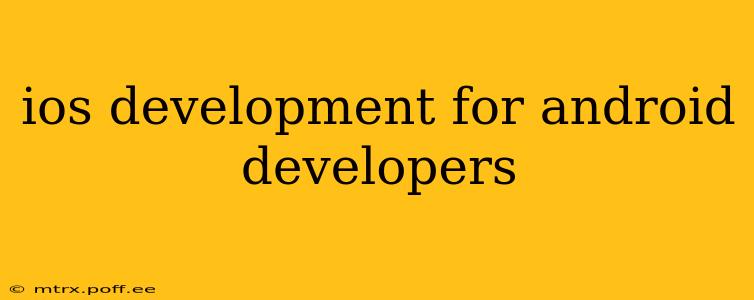For Android developers, the allure of iOS development is undeniable. The iOS ecosystem boasts a loyal user base with high spending power, and tapping into this market can significantly expand your app's reach and revenue. While the platforms differ significantly, your existing Android knowledge provides a solid foundation for a smoother transition. This guide will highlight key similarities, critical differences, and the essential steps to begin your iOS development journey.
What are the Key Differences Between Android and iOS Development?
This is a crucial starting point. Understanding the core differences between Android and iOS development is paramount to a successful transition. While both platforms leverage mobile operating systems, their underlying architectures, development languages, and IDEs differ substantially.
Android uses Java/Kotlin and the Android Studio IDE, while iOS relies primarily on Swift and Xcode. The programming paradigms, although object-oriented in both cases, have subtle but important nuances. Android's development environment is more open and customizable, while iOS emphasizes a more tightly controlled and streamlined experience.
What Programming Language Should I Learn for iOS Development?
Swift is the modern and recommended language for iOS development. Apple actively supports and improves it, making it the best choice for new projects. While Objective-C still exists in legacy codebases, focusing on Swift will give you access to the latest features and best practices. Swift’s clean syntax and modern features make it relatively easy to learn, especially if you already have experience with Java or Kotlin.
How Much of My Android Knowledge is Transferable?
A significant portion of your Android knowledge is transferable. Concepts like object-oriented programming, design patterns, UI principles, and software architecture remain largely consistent. Your experience with application lifecycle management, debugging, testing, and version control will all be valuable assets. However, the implementation details and specific APIs will require dedicated learning.
What are the Essential Tools and Technologies for iOS Development?
You'll need Xcode, Apple's Integrated Development Environment (IDE). Xcode provides a comprehensive suite of tools for coding, debugging, testing, and deploying iOS apps. Familiarize yourself with the Interface Builder, which is Apple's visual design tool for building user interfaces. Mastering Swift and understanding Apple's design guidelines (Human Interface Guidelines – HIG) is critical for creating a user-friendly and aesthetically pleasing app.
What are the Main Frameworks Used in iOS Development?
UIKit is the fundamental framework for building user interfaces in iOS. It provides classes and methods for creating and managing views, controls, and other UI elements. SwiftUI, a more declarative framework, offers a newer, more concise approach to UI development. Core Data is a popular framework for managing data persistence, and Grand Central Dispatch (GCD) is crucial for handling concurrency and asynchronous operations. Understanding these frameworks is key to efficient iOS development.
What is the Best Way to Learn iOS Development?
There are numerous resources available to learn iOS development. Apple's official documentation is an invaluable resource. Online courses, tutorials, and books offer structured learning paths. Active participation in the iOS development community, through forums and online groups, is also highly beneficial for troubleshooting, learning best practices, and staying updated on the latest technologies. Consider building small projects to reinforce your learning.
Can I Use My Existing Android Codebase for iOS?
Directly porting your Android code to iOS is generally not feasible. The underlying architectures, APIs, and programming languages are too different. However, the logic behind your app can often be reused. You can refactor and adapt your core algorithms and data structures to work within the iOS environment. This approach saves significant development time by reusing your already-tested and validated code.
How Long Does it Take to Become Proficient in iOS Development?
The time required varies greatly depending on your prior programming experience and the intensity of your learning. With a strong Android background, you can likely achieve proficiency in iOS development within several months of focused learning and practical experience. Continuous learning and staying up-to-date with the latest technologies are crucial for long-term success.
By leveraging your existing Android expertise and dedicating time to learning Swift and the iOS development environment, you can successfully expand your mobile development skills and tap into the lucrative iOS market. Remember that continuous learning and practical application are key to mastering this new skillset.
